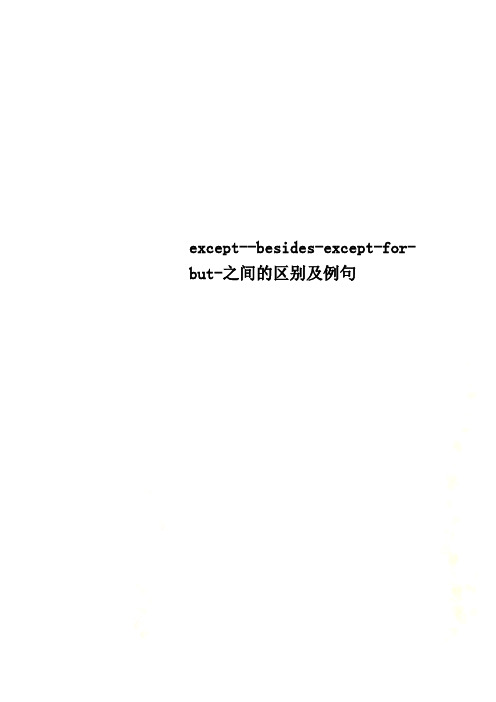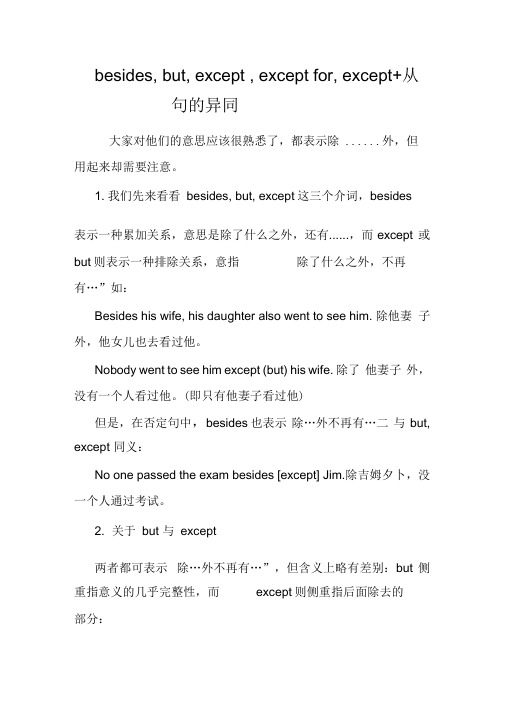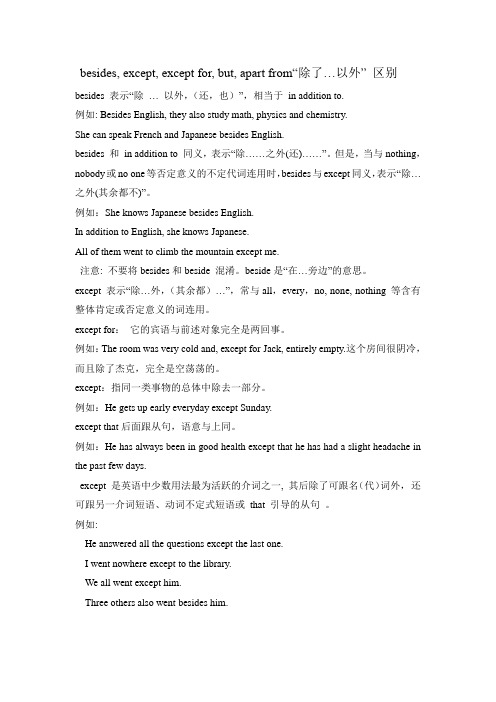except,but,besides,except for 区别
- 格式:ppt
- 大小:101.50 KB
- 文档页数:5

except--besides-except-for-but-之间的区别及例句except ,besides,except for,but 之间的区别及例句这四个介词或者短语都可以表示“除了…”的意思。
但except仅表示“除了…”,排除在外,后面可以接that,what,when等引导的从句;而besides表示“除了…还有…”的意思,表示包含在内;except for表示“除了…”,它引出一个与前面的词相反的原因或者事例;but 的意思与except接近,它主要与某些不定代词如nothing,all,anything,no one,anyone等连用。
例如:"Except for one old lady, the bus was empty."公共汽车上要不是坐了一位老太太就是空的。
She can do everything except cook.除了做饭之外她什么都会。
He had considered everything except the weather."他什么都想过,唯独没考虑到天气。
"I know nothing about it except what I have read in the papers. "除了在报上读到的以外,我对这件事一无所知。
"Most of the Chinese people usually go to work on the bike except when it rains."除了雨天,大多数中国人一般都骑自行车上班。
"Besides milk and cheese, we need vegetables.除了牛奶和干酪外,我们还需要蔬菜。
Besides football, I like playing basketball and table tennis.除了足球以外,我还喜欢打篮球和乒乓球。

besides, but, except , except for, except+从句的异同大家对他们的意思应该很熟悉了,都表示除 ......外,但用起来却需要注意。
1. 我们先来看看besides, but, except这三个介词,besides表示一种累加关系,意思是除了什么之外,还有......,而except 或but则表示一种排除关系,意指除了什么之外,不再有…”如:Besides his wife, his daughter also went to see him. 除他妻子外,他女儿也去看过他。
Nobody went to see him except (but) his wife. 除了他妻子外,没有一个人看过他。
(即只有他妻子看过他)但是,在否定句中,besides也表示除…外不再有…二与but, except 同义:No one passed the exam besides [except] Jim.除吉姆夕卜,没一个人通过考试。
2. 关于but 与except两者都可表示除…外不再有…”,但含义上略有差别:but 侧重指意义的几乎完整性,而except则侧重指后面除去的部分:All are here but one.除一个人外大家都到了All are here except one. 还有一个人没到。
另外,在现代英语中,but的介词用法十分有限,一般说来,它只能用在下列词语之后:①no, no one, nobody, nothing, nowhere 等②any, anyone, anybody, anything, anywhere 等③every, everyone, everybody, everything, everywhere 等④all, none 等也就是说如果没有上述词出现,就不宜使用介词but,而except就没有以上限制。
如:Everyone knows it but (except) you.除你之外大家都知道。

besides , except, except for , but 用法辨析Beside ,except, except for 和but 用作介词时都表示“除…外”,但意义和用法有同有异。
一、besides与except1、在肯定句中,besides “除…,之外(还有)”解,其宾语被包括在内.except 作“除去。
之外”解,表示“排除”意义,其宾语不包括在内。
2、在否定句中,besides和except意义相同。
全局的意义是否定的,而他们后边的宾语却是被肯定的对象。
比较而言,besides在否定句中不如except 常用。
因此,不少人对这一用法不熟悉,甚至1987年成人高考试题中的命题者也出现了失误:He is a strange man. He has no friends _____you.A. FromB. besides c. except D. with命题者给的正确答案是c,实际上是B也是正确答案。
在下面的例句中,besides 的意义均与except 相同。
She has no relations besides an aged aunt.除了一个老年的姑母以外他没有灭的亲戚。
No living creature ever walks in it besides the chaplain. 除了牧师,没有人在里面走过。
He had few friends besides us.除了我们外他没有什么朋友。
We have no other tools besides this.Besides you , no one is qualified.初你之外没有人合格。
3、在疑问句中,besides 和except 有时意义相同,可以换用。
例如:Do you have any other books besides/except these two? 除了这两本书,你还有别的书吗?Have you nothing to tell us besides what we have already heard?Have you no clothes besides those?4、在besides后面,用作宾语的有名词、代词、动名词和不定式。

英语核心词汇besides, except, except for, but辨析详解(1)besides 表示“除……之外(还,全部计算在内)”,宾语被包含在整体之内的部分。
如:We have seen the lion besides the tiger.除了老虎之外,我们也见过狮子。
We learn maths, English besides Chinese.除了中文以外,我们还学习数学和英语。
(2)except 表示“除……之外(其余都,不计算在内)”,指从整体除去一部分,排除的是同类事物。
如:We are all Chinese except Tom in our class. 在我们班,除了Tom 外,我们都是中国人。
(3)except for 也表示排除,但被排除的内容与主语往往不是同一类的。
Your homework is quite good except for a few spelling mistakes.你的作业写的不错,只是有几处拼写错误以外。
(4) but表示“除……之外”常与具有否定意义的词连用。
He has no choice but to wait.除了等,他别无选择。
Loud,loudly,aloud都可以表示“大声地”的含义,但这三个词还是有细微差别的aloud 只能作副词,意思为“出声地”或“大声地”,相对于默读而言,强调出声aloud作“出声地”含义时,主要与read, think等连用,表示声音可以被听到。
作“大声地”含义时,主要与shout, call, cry等词连用。
aloud没有比较级和最高级例句:He read her letter aloud to the rest of the family. 他把她的信大声读给家人听。
They could not speak aloud in the library. 他们不能在图书馆大声说话。
The little boy is crying aloud. 那个小男孩哭的很厉害。

besides, except, except for, but, apart from“除了…以外” 区别besides 表示“除… 以外,(还,也)”,相当于in addition to.例如: Besides English, they also study math, physics and chemistry.She can speak French and Japanese besides English.besides 和in addition to 同义,表示“除……之外(还)……”。
但是,当与nothing,nobody或no one等否定意义的不定代词连用时,besides与except同义,表示“除…之外(其余都不)”。
例如:She knows Japanese besides English.In addition to English, she knows Japanese.All of them went to climb the mountain except me.注意: 不要将besides和beside 混淆。
beside是“在…旁边”的意思。
except 表示“除…外,(其余都)…”,常与all,every,no, none, nothing 等含有整体肯定或否定意义的词连用。
except for:它的宾语与前述对象完全是两回事。
例如:The room was very cold and, except for Jack, entirely empty.这个房间很阴冷,而且除了杰克,完全是空荡荡的。
except:指同一类事物的总体中除去一部分。
例如:He gets up early everyday except Sunday.except that后面跟从句,语意与上同。
例如:He has always been in good health except that he has had a slight headache in the past few days.except 是英语中少数用法最为活跃的介词之一, 其后除了可跟名(代)词外,还可跟另一介词短语、动词不定式短语或that 引导的从句。

beside besides except except for but介绍
这些词语在英语中都是用来表示转折或排除的连词,但它们在用法上有一些细微的差别。
1. Beside:
-意义:表示位置、比较、附加。
-例句:She sat beside me during the meeting.
2. Besides:
-意义:表示除此之外、此外、而且。
-例句:Besides English, she speaks three other languages.
3. Except:
-意义:表示例外、除...之外。
-例句:Everyone passed the test except for John.
4. Except for:
-意义:与"except"类似,表示除了...之外。
-例句:All the students, except for Sarah, handed in their assignments on time.
5. But:
-意义:表示转折、但是。
-例句:The weather was cold, but we decided to go for a walk anyway.
总体而言,这些词语在使用时要根据语境来选择,以确保表达的意思准确清晰。
except、exceptfor、besides、but和apartfrom的区别你知道吗?⼀、except与except for区别(1) 在对象上的区别except主要⽤来谈论同⼀类的东西,⽽except for则主要⽤来谈论不同类的东西。
【例句】The room was very cold and, except for Jack, entirely empty.这个房间很阴冷,⽽且除了杰克,完全是空荡荡的。
本句中,前述对象是'房间',⽽除去的对象是'Jack',两者毫⽆关系。
We h Nobody like him,except his mother.除了他妈妈,没有⼈喜欢他Nobody 和mother是同类的,都是指⼈。
打开UC浏览器查看更多精彩图⽚(2) ⽤于句⾸时的区别在句⾸中只⽤except for,⽽不能⽤except。
【例句】Except for Jim, everyone went there.除吉姆外,⼤家都去了。
(3) 两者都可以使⽤或单独⽤当⽤于all, every, no, everything, anybody, nobody, nowhere, whole等表⽰概括性的词语后⾯时,两者可以⽤。
【例句】You couldn’t hear anything except (for) the noise of Louise typing.除了路易丝打字的声⾳外,你什么也听不到。
Except (for)John, the whole class passed the test.全班同学除约翰外,全都通过了考试。
当其前没有概括性词语时只能⽤except for。
【例句】The house was quiet except for the noise of Louise typing.除了路易丝打字的声⾳外,房⾥安安静静的。
打开UC浏览器查看更多精彩图⽚⼆、 besidesbesides表⽰⼀种累加的除外关系,意思是“除了什么之外,还有……”,强调'除此之外,还包括什么'。
Except&but&besides&except for
1.Except prep介词除了......以外
Except prep介词除了......以外,整体中不包括除去的部分,是个“减法”的概念。
Eg:we all went there except him.
2.Besides 介词“除了......之外”整体中包括了“除去”的部分,是个“加法”的概念。
Eg:Tony and Btty went to the zoo besides
3.But 与except基本相同,句中有no, all nobody 等相同时多用but.
Eg:No one knows it but me.
4.Except for 表示整体情况的“例外”,后接名词或名词性短语。
Eg: He is a good man except for a bad temper.
二、except和except for的区别
Except是将整体中属于整体中的部分除去。
即除去同类 Eg: Everyone is in the classroom except Li Ming.(李明也是“everyone”中的部分)
Except for是将不属于整体中的部分除去。
即除去异类Eg: All the people are the students except for this child.。
英语中意思为“除了……”的表达有except/except for/besides/apart from/but/but for/other than等,它们的用法复杂多变、难以掌握,学生常常为之困惑烦恼。
本文将对其进行总结、归纳、练习,使学生能够系统地掌握它们的用法,消除学生几多愁。
1. except和besides都可解作“除……之外” 但含义不同。
except表示“从所提到的人或事物中除去,即从整体中除去一部分”,表示递减的概念,含义是否定的。
besides表示“除了……之外,还有……”,指“在整体中加入一部分”,表示递加的概念,含义是肯定的。
试比较:①We all went except him.除他之外,我们都去了。
(他没有去)②We all went besides him.除他之外,我们大家也都去了。
(他也去了)(1)besides常与other/more/else等词连用 except常与all/every/everyone/none/nobody/everything/nothing等总括词连用。
eg. All the students in Class One went to the cinema except Li Ping.(2)若句中没有实义动词do的某种形式 except后接动词不定式 而besides 后接动词的-ing形式。
eg.I had no choice except to obey/besides obeying his order.(3)若句中有实义动词do的某种形式 二者后面都可以接动词原形。
eg.She has nothing to do except/besides go with him.(4)二者后面都可以接从句。
eg.①Besides that he explained the theory he gave us some examples.②He is a good student except that he sometimes comes late to school.(5)except后面可接for(构成短语except for)或其他介词短语,而besides不能。